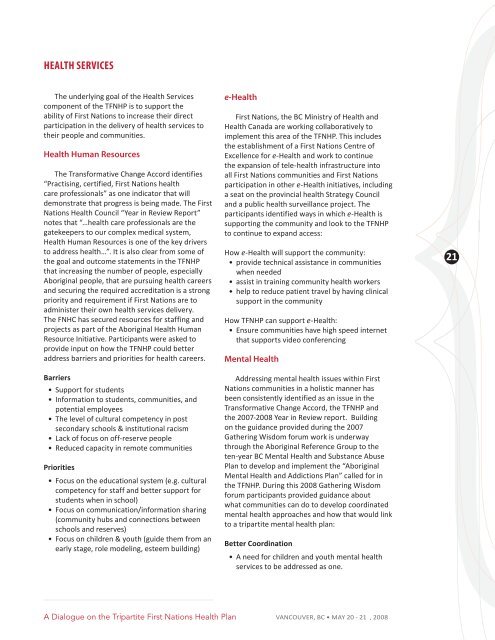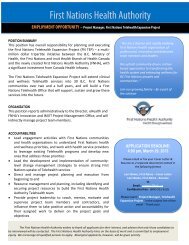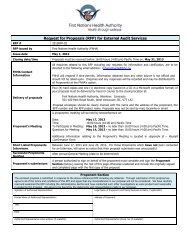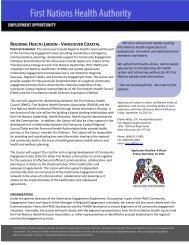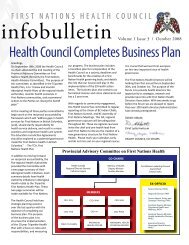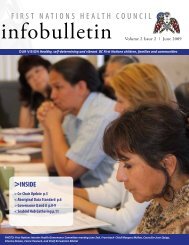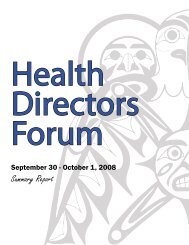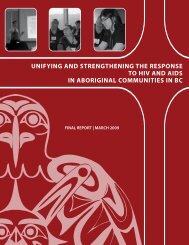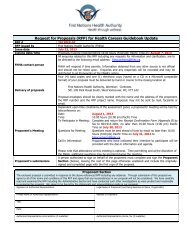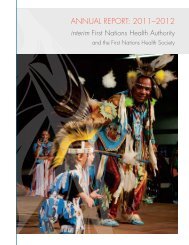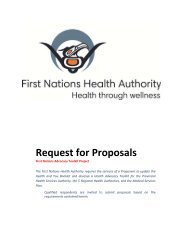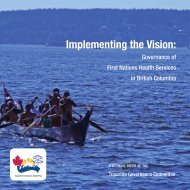pdf download - First Nations Health Council
pdf download - First Nations Health Council
pdf download - First Nations Health Council
You also want an ePaper? Increase the reach of your titles
YUMPU automatically turns print PDFs into web optimized ePapers that Google loves.
HEALTH SERVICES<br />
The underlying goal of the <strong>Health</strong> Services<br />
component of the TFNHP is to support the<br />
ability of <strong>First</strong> <strong>Nations</strong> to increase their direct<br />
participation in the delivery of health services to<br />
their people and communities.<br />
<strong>Health</strong> Human Resources<br />
The Transformative Change Accord identifies<br />
“Practising, certified, <strong>First</strong> <strong>Nations</strong> health<br />
care professionals” as one indicator that will<br />
demonstrate that progress is being made. The <strong>First</strong><br />
<strong>Nations</strong> <strong>Health</strong> <strong>Council</strong> “Year in Review Report”<br />
notes that “…health care professionals are the<br />
gatekeepers to our complex medical system,<br />
<strong>Health</strong> Human Resources is one of the key drivers<br />
to address health…”. It is also clear from some of<br />
the goal and outcome statements in the TFNHP<br />
that increasing the number of people, especially<br />
Aboriginal people, that are pursuing health careers<br />
and securing the required accreditation is a strong<br />
priority and requirement if <strong>First</strong> <strong>Nations</strong> are to<br />
administer their own health services delivery.<br />
The FNHC has secured resources for staffing and<br />
projects as part of the Aboriginal <strong>Health</strong> Human<br />
Resource Initiative. Participants were asked to<br />
provide input on how the TFNHP could better<br />
address barriers and priorities for health careers.<br />
Barriers<br />
• Support for students<br />
• Information to students, communities, and<br />
potential employees<br />
• The level of cultural competency in post<br />
secondary schools & institutional racism<br />
• Lack of focus on off-reserve people<br />
• Reduced capacity in remote communities<br />
Priorities<br />
• Focus on the educational system (e.g. cultural<br />
competency for staff and better support for<br />
students when in school)<br />
• Focus on communication/information sharing<br />
(community hubs and connections between<br />
schools and reserves)<br />
• Focus on children & youth (guide them from an<br />
early stage, role modeling, esteem building)<br />
e-<strong>Health</strong><br />
<strong>First</strong> <strong>Nations</strong>, the bC ministry of <strong>Health</strong> and<br />
<strong>Health</strong> Canada are working collaboratively to<br />
implement this area of the TFNHP. This includes<br />
the establishment of a <strong>First</strong> <strong>Nations</strong> Centre of<br />
Excellence for e-<strong>Health</strong> and work to continue<br />
the expansion of tele-health infrastructure into<br />
all <strong>First</strong> <strong>Nations</strong> communities and <strong>First</strong> <strong>Nations</strong><br />
participation in other e-<strong>Health</strong> initiatives, including<br />
a seat on the provincial health Strategy <strong>Council</strong><br />
and a public health surveillance project. The<br />
participants identified ways in which e-<strong>Health</strong> is<br />
supporting the community and look to the TFNHP<br />
to continue to expand access:<br />
How e-<strong>Health</strong> will support the community:<br />
• provide technical assistance in communities<br />
when needed<br />
• assist in training community health workers<br />
• help to reduce patient travel by having clinical<br />
support in the community<br />
How TFNHP can support e-<strong>Health</strong>:<br />
• Ensure communities have high speed internet<br />
that supports video conferencing<br />
Mental <strong>Health</strong><br />
Addressing mental health issues within <strong>First</strong><br />
<strong>Nations</strong> communities in a holistic manner has<br />
been consistently identified as an issue in the<br />
Transformative Change Accord, the TFNHP and<br />
the 2007-2008 Year in Review report. building<br />
on the guidance provided during the 2007<br />
Gathering Wisdom forum work is underway<br />
through the Aboriginal Reference Group to the<br />
ten-year bC mental <strong>Health</strong> and Substance Abuse<br />
Plan to develop and implement the “Aboriginal<br />
mental <strong>Health</strong> and Addictions Plan” called for in<br />
the TFNHP. During this 2008 Gathering Wisdom<br />
forum participants provided guidance about<br />
what communities can do to develop coordinated<br />
mental health approaches and how that would link<br />
to a tripartite mental health plan:<br />
Better Coordination<br />
• A need for children and youth mental health<br />
services to be addressed as one.<br />
21<br />
VANCOUVER, bC • mAY 20 - 21 , 2008


